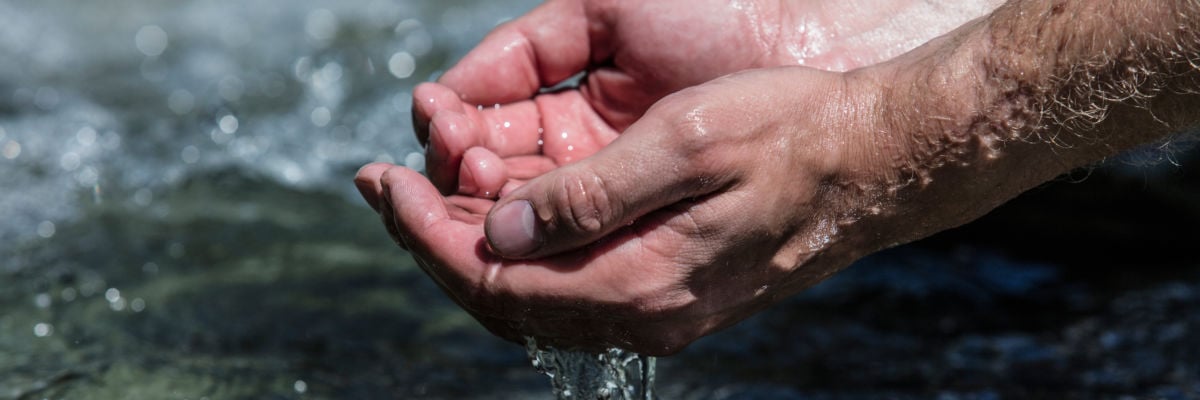
Yesterday’s reading at Mass contained that most marvelously pithy saying of John the Baptist from John’s gospel: “I must decrease. He must increase.”
Today we see this play out in Luke’s account of the Lord’s baptism in the Jordan. This is, let’s remember, pretty incredible. People wanted John to be the Christ. If he had said he was the Christ, they would have had no trouble believing him. And John takes that potential power and influence and casually sets it aside.
His humility paves the way for the even greater humility of the true Christ, who himself enters the waters for John to baptize. Our Gospel selection for today doesn’t include some of the dialogue reported elsewhere between John and Jesus, but in a way, it’s predictable. John is confused. He has been talking all this time about the one who is greater than he, whose sandals he is not worthy to untie, who will baptize the world with fire, and this great anointed one approaches him and asks to be baptized like everybody else. Really, Lord, why? I mean, shouldn’t you be baptizing me?
This is part of a large pattern in the Gospels. Perhaps one reason this story appears to us in the immediate context of the Christmas season is that we are conscious of the Son of God’s human vulnerability and humility. This is all headed to the cross, but before that we find Jesus washing the feet of his disciples and declaring that he calls them not slaves, but friends.
At the baptism, Jesus is publicly identified as the Son of the Father, and this identity is witnessed by the Spirit in the form of a dove. Various heretics in the early centuries, grouped together under the loose label adoptionism, saw this as a moment when the human person Jesus was somehow elevated to divinity. Church councils repeatedly rejected this theory in the first several centuries, even as the formal articulation of Trinitarian and Christological doctrine developed. But the problem I have with this view of the baptism is that it seems to miss the way it fits in with the whole gospel trajectory. If the baptism necessitates some kind of progression or elevation of Christ, so does virtually every other incident of his life. If it is merely human to submit to baptism, what would it take to submit to crucifixion?
In fact, the Fathers’ reading of this story show how it is precisely Christ’s divinity, in his baptism, that makes the difference. Christ was not baptized so that he might be sanctified in the water and become somehow more divine. He was baptized so that he might sanctify the water.
What does it mean to sanctify or consecrate something? It means to set it apart, to mark it somehow. That is the most fundamental meaning of holiness—including, as a transcendent example, the holiness of God. God is utterly unique; he has no equal, no real comparison. When we are baptized, we are consecrated; we are set apart by what the Letter to Titus calls the “laver of regeneration” and the “renovation of the Holy Ghost.” And water has specifically been set apart for this purpose.
But think about this: when we are baptized, is this consecration something ultimately contrary to our nature? True, it is an elevation of our nature, yet it is an elevation that was always intended—our nature was, from the beginning, oriented toward supernatural fellowship with God. And so it is not so much that baptism changes us—though from the perspective of sin, it certainly does that—but that it restores and reanimates what we truly are.
We can apply that to other kinds of consecrations. When we bless water for baptism, we aren’t adding something to water; we are in a way reminding water of its true purpose, which is the life of God. When Jesus entered the waters of the Jordan, he wasn’t somehow invading nature with a foreign substance. He was meeting his own creation face to face and saying, “Remember me?”
There is a liturgical and sacramental shape to creation. When we celebrate the Mass, part of the miracle is not so much to realize that bread and wine can become body and blood, but to realize that so much of the time, they do not do so even though they could. Think of it as pulling back the curtain and showing the true purpose of all time and space—which is to say that it is the time and the place for fellowship with God. This is why we have—in the normal sense—sacred times and sacred places: to heighten our senses and our intellectual contemplation of the fact that God has entered all times and all places to the end of bringing all things into the light of his glory.
Today, as we remember the Lord’s baptism, remember also the hope that it contains—the hope that all things can and will be restored to God’s goodness. In our own baptisms, we were restored to who we are, but it is only in holding fast to our communion with Christ that we can remain who we are. We can say, with John the Baptist, I must decrease; he must increase.
Another way of putting it is this: if I am only myself alone, I am not even that. I can find who I am only in the voice of the one who calls me beloved, who knew me even before I knew myself, and who will call me again to himself in the last day. Amen.



